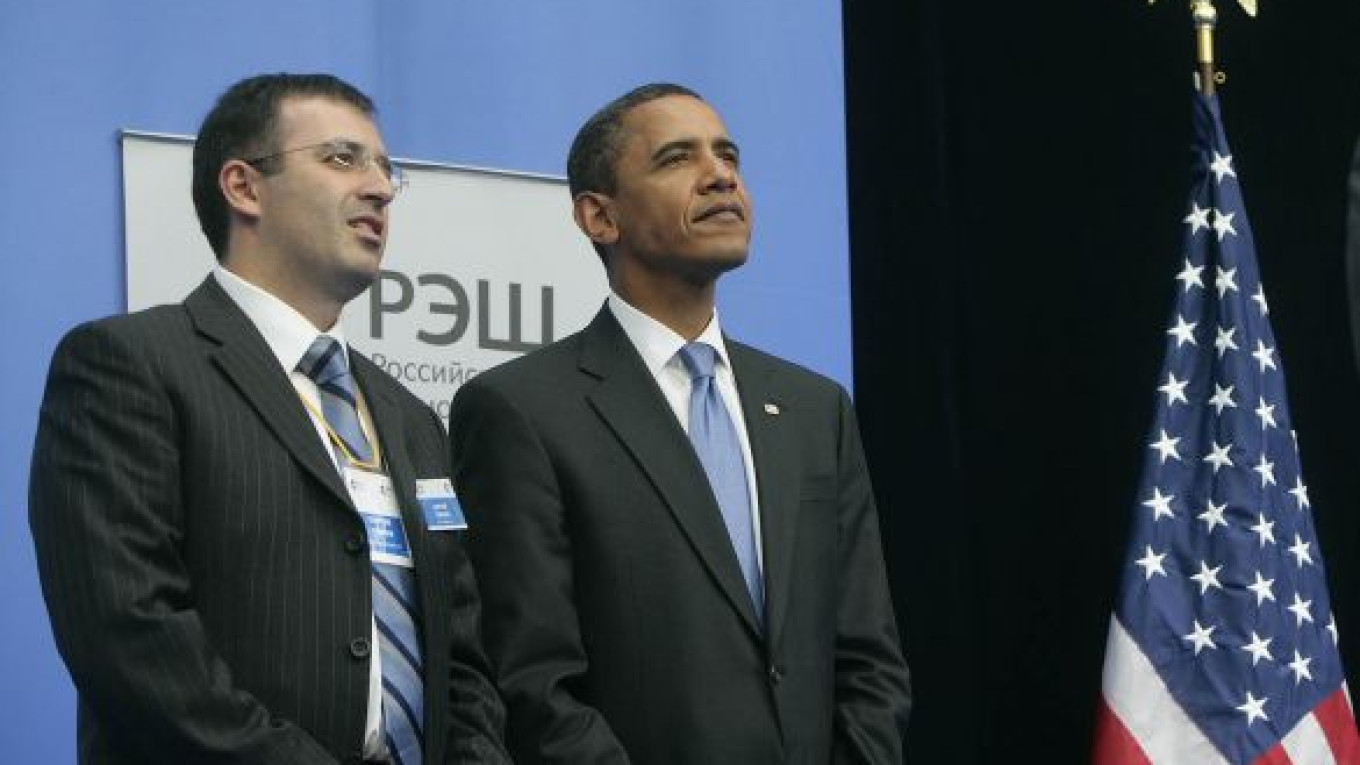A minister said Wednesday that Prime Minister Dmitry Medvedev's Open Government would continue to work with prominent liberal economist Sergei Guriyev despite media reports that he resigned as head of a major college and left the country under pressure from authorities.
Mikhail Abyzov, the Open Government liaison holding the rank of minister, said that he and Medvedev highly valued Guriyev's expertise, ITAR-TASS reported Wednesday. The Open Government is a group of experts advising the Cabinet.
Guriyev has been pressured to leave his post as a professor and rector at the New Economic School in Moscow over his support of opposition leader Alexei Navalny, Vedomosti reported Wednesday, citing sources familiar with the situation.
The newspaper, citing a federal government official close to the ruling United Russia party, said Wednesday that authorities were irritated by Guriyev's open support of Alexey Navalny and other opposition leaders.
A prominent liberal economist, Guriyev has headed the New Economic School, one of the most prestigious economic institutions in the country, since 2004. The school's board of directors includes Deputy Prime Minister Arkady Dvorkovich.
'You can’t occupy top posts if you work on issues not approved by the government.'
Natalya Pelevina
Opposition activist
The school has not yet confirmed his resignation, saying that Guriyev is still the rector and is now vacationing in France, where he will stay with his family until June 7. Guriyev confirmed to the New Times that he is staying in France and hinted that he was afraid of the future.
"Everything is fine. It is better in Paris than in Krasnokamensk," he wrote on Twitter, referring to the city in Zabaikalsky region where Yukos founder Mikhail Khodorkovsky spent a part of his sentence in prison. He later deleted this message.
On Tuesday Prime, citing a source in academic circles, said "important events" influenced Guriyev's decision to leave, but did not elaborate.
Guriyev, an outspoken commentator and regular fixture at major investment conferences, has come under official scrutiny in recent weeks. The Investigative Committee questioned him last month in connection with the politically tinged case into the Yukos oil company.
Tax authorities also visited the school's premises around the same time, according to the New Times.
As an expert for the Kremlin's human rights council, Guriyev took part in an evaluation of Khodorkovsky's second trial, concluding that he was sentenced unjustly.
The Investigative Committee said Wednesday that Guriyev was questioned about the Yukos case a month ago, Interfax reported.
A source close to the New Economic School told The Moscow Times that problems were connected to Guriyev personally and not to the university itself. He refused to comment further and demanded anonymity, saying he did not want to draw unwelcome attention to himself.
But Pavel Salin, director of the Moscow Financial University's Center for Political Research, said that the situation with Guriyev shouldn't be seen as "purely political" and might have something to do with tax authorities' claims against the New Economic School.
Separately, Guriyev on Tuesday declined to run for a seat on the board of directors at Sberbank, the nation's biggest lender. He asked Sberbank to exclude him from the list of candidates, saying his decision was motivated by "personal reasons" and no one had put any pressure on him, Vedomosti reported.
Asked whether the Kremlin was aware of the situation with Guriyev, President Vladimir Putin's spokesman Dmitry Peskov told Vedomosti that Guriyev's whereabouts were his "personal matter."
Guriyev, who advocates privatization and reducing the government's role in the economy, was an active supporter of Medvedev during his presidential term, seeing him as an alternative to Putin.
Last year, Guriyev used one of the Open Government meetings chaired by Medvedev to voice his support for Navalny.
Guriyev also wrote a recommendation letter to Navalny to attend a program at Yale University in 2010.
Nikolai Zlobin, head of the World Security Institute in Washington, has called Guriyev one of the most "authoritative and influential Russian economists of his generation" in a Facebook post.
But Oleg Matveichev, a former presidential administration official, said that New Economic School's influence was "overestimated."
"It has been seen as a sort of a sect," he said.
Sergei Markov, a vice president of the Plekhanov Russian University of Economics, called the New Economic School a "principal enemy of the state influence" in the economy and an outpost of "socially irresponsible capitalism".
Markov, known for his pro-Kremlin stance, named former Deputy Education and Science Minister Igor Fedyukin, a former employee of the New Economic School, among Guriyev's allies.
Fedyukin resigned from his post on Tuesday, citing "unprecedented pressure" from the ministry.
Opposition activist Natalya Pelevina said the presumed pressure put on Guriyev showed that the authorities were sending a message to society.
"[The message is that] you can't occupy top positions if you are trying to work on issues not favored by the government."
Contact the author at [email protected]
Related articles:
A Message from The Moscow Times:
Dear readers,
We are facing unprecedented challenges. Russia's Prosecutor General's Office has designated The Moscow Times as an "undesirable" organization, criminalizing our work and putting our staff at risk of prosecution. This follows our earlier unjust labeling as a "foreign agent."
These actions are direct attempts to silence independent journalism in Russia. The authorities claim our work "discredits the decisions of the Russian leadership." We see things differently: we strive to provide accurate, unbiased reporting on Russia.
We, the journalists of The Moscow Times, refuse to be silenced. But to continue our work, we need your help.
Your support, no matter how small, makes a world of difference. If you can, please support us monthly starting from just $2. It's quick to set up, and every contribution makes a significant impact.
By supporting The Moscow Times, you're defending open, independent journalism in the face of repression. Thank you for standing with us.
Remind me later.


